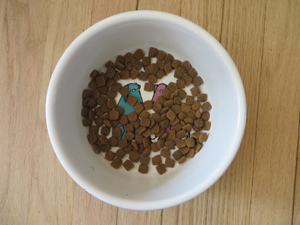kibble in food bowl

Photo by VIN
Can pet diets cause heart problems?
Yes. Thirty years ago, veterinarians recognized deficiency of an amino acid (taurine) as the most common cause of dilated cardiomyopathy in cats. Cats are unable to make their taurine (just like people can’t make their own vitamin C) and must ingest it to stay healthy. Taurine is plentiful in most animal tissues.
Being carnivores, domestic, feral, and wild cats that hunt for food get adequate amounts of taurine from their diet. However, some commercial cat foods at that time contained insufficient amounts of taurine causing dilated cardiomyopathy and other health issues. This discovery resulted in pet food companies adding more taurine to their manufactured foods. Subsequently, taurine-associated dilated cardiomyopathy in cats has all but disappeared. It is occasionally diagnosed when cat owners feed unbalanced diets (e.g., boiled poultry or vegetarian diets).
A few years later, certain breeds of dogs were found to also have dilated cardiomyopathy in association with taurine deficiency. This was unexpected because dogs, unlike cats, can synthesize taurine from other sulfur-containing amino acids in their food. Investigators suspected that these breeds were unable to synthesize taurine in amounts needed to replace losses. Taurine is typically efficiently recycled in the small intestine, but various dietary factors can affect this process. When supplemented with high doses of taurine, these dogs resolved their cardiomyopathy in many cases.
Since that time, specific categories of diets have been sporadically linked to heart disease. One group of Newfoundlands that were fed a commercial lamb-and-rice diet developed taurine deficiency and reversible cardiomyopathy. Other dogs have also been found to have a taurine deficiency when fed similar lamb-and-rice diets. Occasionally, dogs fed vegan or vegetarian diets have been taurine deficient and suffer heart disease.
Most recently, Golden Retrievers have been identified as having a taurine-deficiency associated cardiomyopathy.
Is diet-associated cardiomyopathy caused by taurine deficiency?
The evidence suggests that the recent “outbreak” of cardiomyopathy in dogs is likely not primarily related to taurine deficiency. Blood assays of taurine in many affected dogs show normal taurine concentrations. The observations suggesting this condition is related to taurine deficiency originate from populations where several of the affected dogs were Golden Retrievers (who are a special case, as described above). It is hypothesized by some that being taurine deficient makes these dogs more susceptible to whatever is causing the diet-associated cardiomyopathy. Because of concerns from some veterinary researchers about the methods used to assess taurine status in the studied populations with few or no Golden Retrievers, we cannot completely rule out the role of taurine deficiency at this time in all breeds. Time will tell.
If it’s not taurine, what is the cause?
We don’t know. The only common link that investigators have observed is “grain-free” diets that use lentils and other legumes (peas) as the “base ingredient.” There are many theories, but no definitive answers explaining how these diets cause cardiomyopathy. There is also a lack of reporting and consistent data collection on diet-related heart issues in pets. Cardiomyopathy is most likely caused by a combination of genetics, other medical conditions, and diet.
Are all “limited ingredient” or “grain free” diets at fault?
Some dogs are prescribed diets to diagnose and treat allergies (skin or gastrointestinal diseases). Such diets might include a limited number of uncommon ingredients, such as salmon, kangaroo, potatoes, peas, etc. At this point, no therapeutic diets, manufactured by the major pet food manufacturers (Hills, Purina, Royal Canin), have been associated with cases of diet-associated cardiomyopathy.
There is no medical or nutritional indication for “grain free” although some veterinary therapeutic diets recommended to diagnose and treat allergies are also grain free. They are chosen because the ingredients happen to be novel for the specific patient, but they are not used because they lack grains per se. Grain free is simply a marketing category and there is no specific benefit.
In recent years, canine diets containing pulses, which are the dried seeds of foods like chickpeas, lentils, beans, and dry peas, have been linked to diet-associated cardiomyopathy versus just the presence or absence of grains (corn, rice, and wheat).
What should I do if my dog eats a grain-free legume-based or other implicated diet?
First, check the ingredient label. If peas or lentils are the main ingredient (or main carbohydrate source), consider changing to a diet that contains grains.
Second, if you are reluctant to change the diet, consult your veterinarian about having a cardiac ultrasound (echocardiogram) to see if your dog has evidence of cardiomyopathy. If your dog is found to be affected, even if it’s showing no clinical signs, change the diet to a grain-based commercial diet. Most nutritionists recommend using the WSAVA guidelines for the selection of commercial diets.
Third, if you have a dog that is “at risk” for taurine deficiency (American Cocker Spaniel, Golden Retriever, Newfoundland, Dalmatian) and eating an implicated diet, have the blood taurine levels checked. Measure both whole blood and plasma collected at the same time to enable the most accurate interpretation of your dog’s taurine status. If those are low, determine if the dog has cardiomyopathy with a cardiac ultrasound, change the diet, and supplement taurine as directed by your veterinarian.
The more data collected, the more likely researchers will be able to resolve whether taurine deficiency plays a primary or secondary role in causing this diet-associated cardiomyopathy.
Your veterinarian or veterinary cardiologist is the one best able to advise you about the most appropriate course of action for your dog.
What about cats?
A few cat cases have been reported to the FDA, but the numbers are too small to say anything definitive. This appears to be primarily a dog problem.